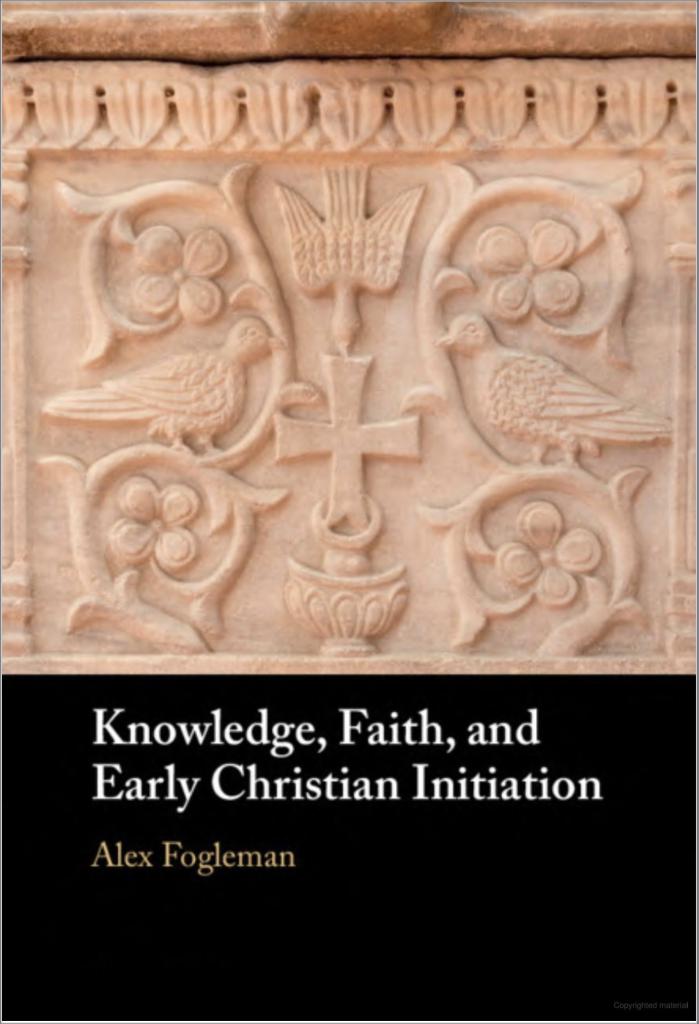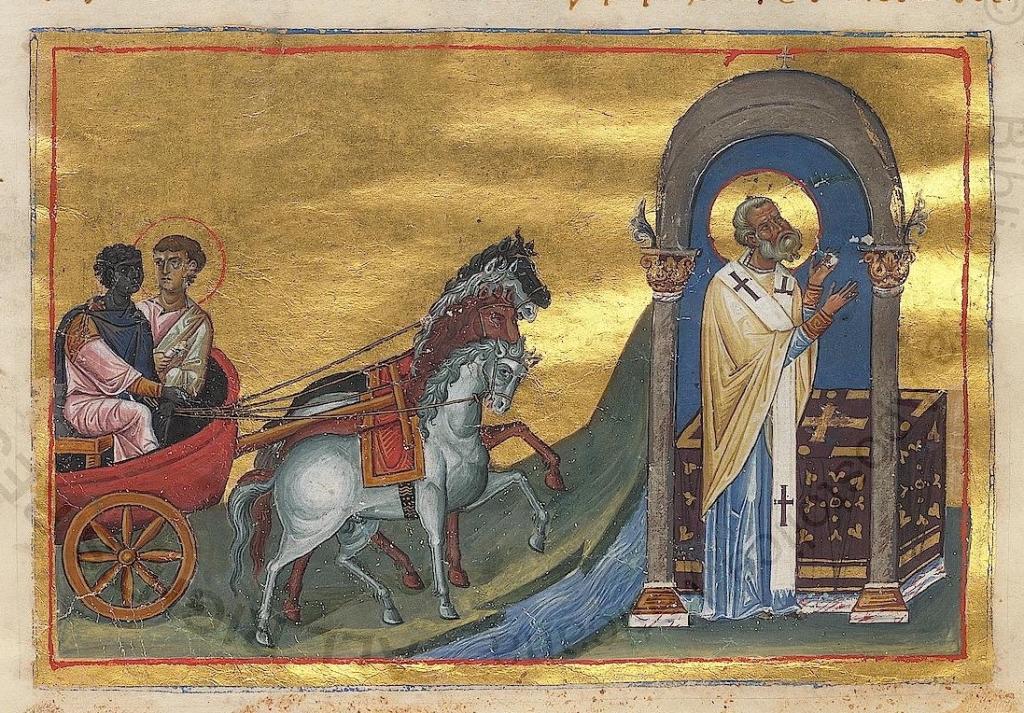Today, I am delighted to welcome a guest blogger, who presents the findings of his important new study of the earliest church. He really gets into some significant issues here.
The author is my colleague Alex Fogleman. Alex is an Assistant Research Professor of Theology at Baylor University’s Institute for Studies of Religion, project manager for the Global Flourishing Study, and director of the Catechesis Institute. He is the author of Knowledge, Faith, and Early Christian Initiation (Cambridge University Press, 2023). He holds a PhD in Patristics and Historical Theology from Baylor University, and an MDiv from Regent College (Vancouver, BC).
Knowledge, Faith, and Early Christian Initiation
by Alex Fogleman
You can tell a lot about a group by how it initiates new members. If it’s not that hard to join, is it that worth doing? (“I’d never want to join a club that would have me as a member”)? What about joining a cult, or becoming a citizen of a new country? What’s different when one joins CrossFit, or starts frequenting a new pub? All of these kinds of communities require different kinds of education and initiation, and these tell you a lot about the kind of community it is.
In my recent book, Knowledge, Faith, and Early Christian Initiation (Cambridge University Press, 2023), I look at the many ways that early Christians taught new members to know God in preparation for baptism—what is often referred to as “catechesis.” By knowledge, of course, I don’t just mean a set of statements about Christianity that pastors wanted new members to become aware of. Knowledge—and the process of knowing—is always bound up with a host of beliefs, narratives, and practices shaped by particular historical contexts, interwoven with a multitude of political, economic, and educational factors.
For early Christian communities, knowledge belongs not just within the realm of ideas but also within practices of liturgy, asceticism, art and architecture, texts, and other historical artifacts. At the center, it cannot be denied, is how Christians understand Jesus Christ—not only a historical character but also one “in whom” Christians claim to know the one true God and the world made by and through him. “If you’ve seen me,” Jesus tells Philip (and all Christians thereafter), “you see the Father” (John 14:9).
But in textbook histories of catechesis, the story is too often reducible to Christianity’s socio-political standing in the empire. In the centuries before Constantine legalized Christianity, this story often goes, catechesis was as a lengthy, arduous exercise—a robust instruction in biblical doctrine and moral formation. If a believer could be handed over to the authorities just by associating with the name “Christian,” one had to be sure new converts were up for the challenge—that needed to be proved like iron in the fire. But after the Constantinian revolution, the story continues, when everyone now wanted to be a Christian, a new problem arose: elites clambering to get in but not knowing what they’re getting into. They thought joining Christianity would be like joining any traditional religious cultus. And not wanting to disappoint, Christian leaders (many of them also elites) accommodated the catechumenate to serve these purposes: from several years to several months, the standards for entry were slackened, and as infant baptism took over, eventually the catechumenate disappeared altogether.
As you might have guessed, this isn’t the way I see the story. When we look at a more granular level, things are much more interesting. Let’s take Tertullian, to start. He’s most famous (in the history of catechesis, at least) for his comment (a throwaway line in the Apology) that “Christians are made, not born.” It takes training and time to be a Christian. In On Baptism (written around the year 200), he puts it like this:
The delay of baptism is more profitable in accordance with each person’s character, attitude, and even age… . So let them come [to baptism] when they are growing up, when they are learning, when they are being taught that to which they are coming. Let them be made Christians when they have become able to know Christ. (On Baptism 18)
Tertullian—here the great champion of Baptists everywhere—argues that the delay of baptism is a good thing indeed. People should know what they’re getting into before (pardon the pun) taking the plunge.
What we don’t always notice, though, is that Tertullian is making an argument for this position. He’s engaged in dialogue—there’s someone on the other end of the line, so to speak, who doesn’t agree him. And though we don’t have this person’s voice in writing, we can gather from Tertullian’s argument what the counterargument might have been.
A key issue is how to read the Bible. Some people apparently understood the biblical text “give to everyone that asks of you” from Luke 6:30 to justify immediate baptism. Tertullian quickly brushes this interpretation aside, though, because, as he says, it applies to almsgiving, not baptism. But what about the Ethiopian Eunuch in Acts 8? This text presents a more serious challenge. By any plain reading, Philip preaches the gospel, and the Eunuch is baptized right away. But, Tertullian contends, the Eunuch didn’t come unprepared. He was not at uninterested in the faith, nor was he simply overcome with a sudden irrational desire to be baptized. He was, after all, on his way to the Temple to pray and, in Tertullian’s summary, “intent upon divine Scripture.” The Eunuch, in other words, didn’t just wake up one day and decide to be baptized; he was already being prepared through deep devotion and attentive study of Scripture.
Irenaeus of Lyons, interestingly—around the same time—confronts a similar issue, and the same text. He is trying to explain why St. Paul “labored more than the rest” (1 Cor. 15:10)? It is because, Irenaeus explains, Paul’s mission was to preach to the Gentiles, not just the Jews, and this audience needed to be “pre-catechized” (praecatechizatus), Irenaeus writes, as the Ethiopian Eunuch was: “Philip had no great labor to go through with regard to this man,” Irenaeus writes, “because he was already prepared in the fear of God by the prophets” (Against Heresies 4.23.2). The Gentiles, meanwhile, needed to depart from idols, to worship one true God who made the world by his word, and to conform to the basic ethical pattern of Jewish life. Paul had to labor “more than the rest” indeed!
If might seem, again, that a lengthy catechumenate was simply the early Christian position on catechesis; it was not. It was something that had to be argued for. It was a position to be defended.
It was, as it happens, still in need of defending several hundred years later—now by the mighty Augustine of Hippo. The subtext for his treatise On Faith and Works (a popular text during in the Reformation; look closely at what’s on Cranmer’s desk) is about setting parameters for who should be baptized and how they should be prepared for it.
Augustine’s interlocutors this time are a group of Christian lay people who, out of “commendable charity,” Augustine writes (with just a hint of sarcasm), think that only those who have learned the faith (i.e. the creed) should be brought to baptism. They don’t need to learn “morals,” or evidence any kind of reformation of life. Augustine’s opponents, it seems, are a kind of anti-Donatist reactionary group. Unlike the Donatists, they want to lower the bar for entry. Don’t make people jump through a bunch of hurdles; just teach the essentials and move on. They can get morals sorted out later.
But while Augustine is normally the indefatigable opponent of rigorism—the champion of “Christian mediocrity”—here he takes up the other side, defending the lengthy approach to baptismal preparation:
What’s all that time for, when they hold the status and title of catechumen, if it’s not for them to hear what a Christian should believe and what kind of life a Christian should lead, so that, when they have proved themselves, they may then eat from the Lord’s table and drink from his cup? (On Faith and Works 6.9)
Augustine argues that just as there’s an orthodox “middle way” between doctrinal heresies (Arianism on one side, Sabellianism on the other) and between ascetic heresies (total rejection of marriage versus absolute equality between celibacy and marriage), so there is an orthodox middle way for baptismal preparation: yes, there will always be, in this life, wheat and chaff mixed together, but that’s no reason to reject a disciplined approach to catechesis.
Once again, the argument turns to Scripture. Once again, the Ethiopian Eunuch appears as a witness on the side of Augustine’s opponents (see On Faith and Works 9.14). And once again, Augustine goes to great lengths, like Tertullian, to read that story in a way that implies a robust notion of catechetical formation. Above all, we should look to Christ. We should take notice, Augustine argues, “how Christ crucified is taught and learned, and be aware that it relates to his cross that in his body we too are crucified to the world” (On Faith and Works 10.15). As it goes with Christ, so it ought to go with the instruction of those formed in his image.
The examples here could be multiplied, but the point is this: early Christian catechesis was a complex and multilayered system of theological, political, educational, and, above all, biblical reflection. In every age, in every community, rules for baptism were both handed down (“traditioned”) and something to be argued about. When we get down to the details, we see a vibrant and vivid picture of the church at work—deeply engaged in understanding how, given the extordinary reality of Jesus Christ, Christians should teach what it means to know God.















